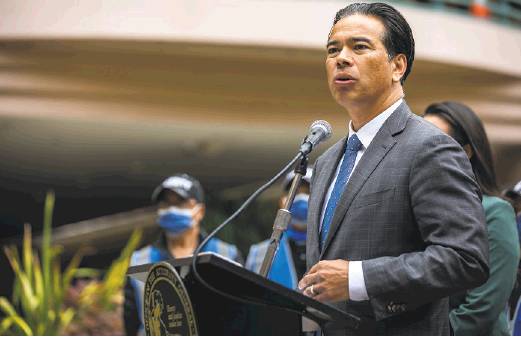Racial backlash cited in attacks
Bonta decries state’s rise in anti-Black hate crimes
By Shwanika Narayan
An alarming rise in anti-Asian attacks in California may have obscured another bleak statistic for the state last year: Hate crimes against Black people increased to their highest number in more than a decade.
According to a report released last week by the California Department of Justice, 457 hate crimes with an anti-Black or anti-African American bias were reported to law enforcement in 2020. That represents a nearly 88% increase from 2019.
While crimes with an anti-Asian bias experienced the largest year-to-year increase from 2019 to 2020 at 107%, the number of actual crimes was comparatively smaller, with 89 reported last year.
In a news conference last week in Oakland’s Chinatown, Attorney General Rob Bonta faulted the rhetoric of past leaders for inflaming animosity against people of Asian descent. Asked by The Chronicle on Thursday what could have driven last year’s crime surge targeting Black people, Bonta reiterated that message and referenced former President Donald Trump, who he said “used the biggest bullhorn on the planet” to sow division.
“I believe the language that some of our leaders used, including the former occupant of the White House, pushing out messages of hate and xenophobia and racism and discrimination, has fueled the rise in hate crimes,” Bonta said. “It’s very clear that we are in the middle of a racial justice reckoning.”
Along with a global pandemic that disproportionately infected and destabilized people of color, America in 2020 also experienced once-in-ageneration civil unrest over police brutality and systemic racism. Race relations experts say the rise in hate crimes targeting Black Californians could represent a backlash to the calls for systemic justice after the murder of George Floyd.
“Can some of the violence against African Americans be a backlash against what people see as unsettling advocacy on behalf of, or for, African Americans? Yes, that seems pretty plausible,” observed Ralph Richard Banks, a Stanford University law professor and director of the Stanford Center for Racial Justice.
“One theory to consider is that this is a backlash against the Black Lives Matter movement,” added Jack Glaser, a professor at UC Berkeley’s School of Public Policy who researches stereotyping, prejudice and discrimination.
If one group starts to assert power through protests, that is going to be threatening to the hegemonic group, Glaser explained.
“The hegemonic group here are white Americans,” he said. “It’s entirely reasonable to at least entertain the hypothesis that part of the uptick we’re seeing in hate crimes against Black people is a backlash.”
California defines a hate crime as a criminal act committed against a person or their property based on their real or perceived disability, gender, nationality, race or ethnicity, religion, or sexual orientation. The crimes themselves fall under a number of categories: concerning antiBlack hate crimes, 170 (37%) involved some form of physical assault, 162 (35%) were property crimes and 113 (25%) were acts of intimidation, a Justice Department breakdown shows.
In the nine-county Bay Area, regional police agencies recorded 105 hate crimes against Black residents, 37 against Latino residents, 35 against Asian residents and 25 against white residents last year.
Santa Clara County documented the most racially biased hate crimes, with 44 against Black people and 14 apiece against Latino and Asian people. Napa was the only Bay Area county to report zero hate crimes to the state’s Justice Department, while San Mateo was the only one to report more hate crimes against white people (4) than Black and Latino people (3 each).
Obtaining accurate data on hate crimes is complicated by the distrust some minority and immigrant communities have toward law enforcement, both Banks and Glaser said.
Even when people do report hate crimes, the criminal justice system rarely provides closure.
Of the 1,330 hate crime events reported to police in California last year, only 430
(32.3%) were referred to local prosecutors, only 49 (3.7%) resulted in hate crime convictions while 46 (3.5%) resulted in other convictions.
A Stanford Law School report released in June found that the current approaches to confronting hate crimes rely heavily on “increased law enforcement and imprisonment” and offered alternative suggestions, such as restorative justice, to mend harms caused by hate crimes.
During his news conference, Bonta said it’s his duty as attorney general to protect people from “the forces of hate, where individuals are being attacked because of who they are, where they’re from, how they worship or who they love.”
The Filipino American son of labor activists said it’s why his office launched a Racial Justice Bureau in May, to make hate crime reporting easier and investigations more regional.
“It’s important now more than ever for our leaders in the community, in government, in law enforcement to protect our people,” he said. “As the people’s attorney, their fights will be my fights.”
While hate crimes based on racial bias increased across the board in California, hate crimes targeting religion and sexual orientation dropped. Hate crimes against transgender people, who reported 54 incidents last year, were up 86% from 29 in 2019.
As to why more than half of the hate crimes reported to law enforcement last year were driven by an anti-Black bias when Black people make up only 6.5% of California’s population, Banks emphasized that there was no way of telling without more data. But the Stanford professor pointed out that deep-rooted racial divisions predate the country’s founding.
“It’s a reality we have to face and grapple with,” Banks told The Chronicle. “That racial hostility has existed in this country for a long time, and it still persists today.”
Shwanika Narayan is a San Francisco Chronicle staff writer. Email: shwanika.narayan@sfchronicle.com Twitter/Instagram: @shwanika
“It’s very clear that we are in the middle of a racial justice reckoning.”
Rob Bonta, California attorney general
